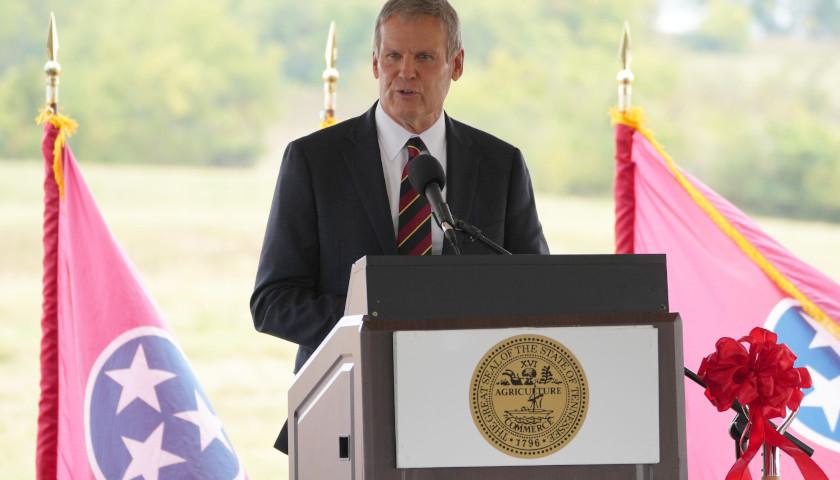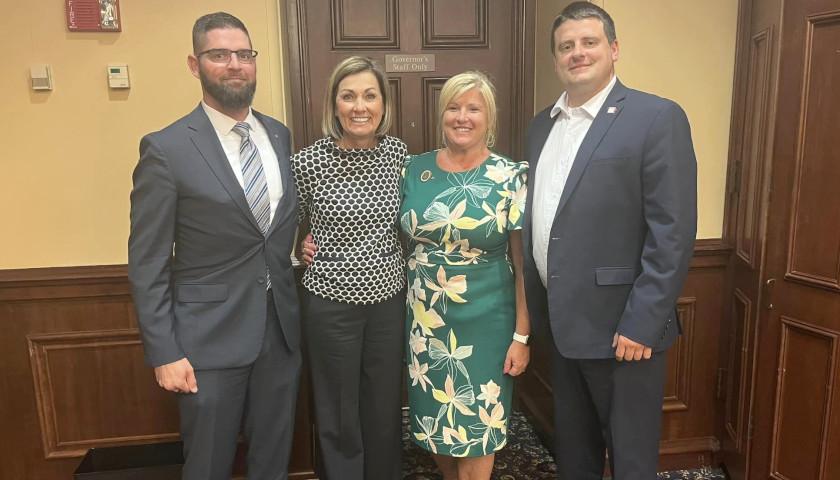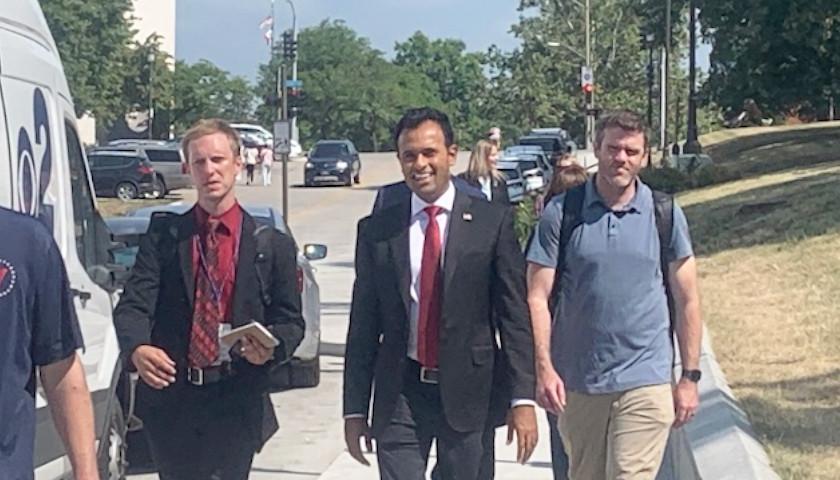The schedule for the Senate Judiciary Committee summer study of the Heartbeat Bill was announced Thursday via email to committee members and staff.
The scheduled dates just announced – Monday and Tuesday, August 12 and 13 – are changed from the original dates set during the Senate Judiciary Committee meeting on April 9 when the bill was sent to summer study.
Originally, the dates set by Senate Judiciary Committee Chairman Mike Bell (R-Riceville) for the summer study were Tuesday and Wednesday, August 13 and 14.
However, those dates created a conflict with the 46th American Legislative Exchange Council (ALEC) 2019 Annual Meeting scheduled for August 14 through 16 in Austin, Texas, which is attended by many members of the Tennessee General Assembly.
The email, sent by the Senate Judiciary Committee’s Research Analyst stated that the summer study meeting on SB 1236 has been scheduled for 1:00 p.m. to 4 p.m. on Monday, August 12, and from 9:00 a.m. to 12 noon on Tuesday, August 13, although it may go into the afternoon if more time is needed. A specific location, while assumed to be within the Cordell Hull Building, was not identified.
The Fetal Heartbeat Bill, which prohibits abortions from the point a fetal heartbeat is detected, passed through the state House as HB0077 on March 7 by a vote of 65 Ayes, 21 Nays and 7 Present Not Voting.
Meanwhile, the Senate version of the Heartbeat Bill SB1236 was first referred to the Senate Judiciary Committee on February 11. It then took nearly two months before it was heard in the Committee.
During the April 9 Senate Judiciary Committee meeting, approximately an hour and a half of testimony was heard, as reported by The Tennessee Star.
Testimony came from a volunteer attorney speaking on behalf of Planned Parenthood in opposition to the bill – a move strongly objected to by Senator Kerry Roberts (R-Springfield) – as well as Murfreesboro-based obstetrician/gynecologist Dr. Brent Boles and former State Senator, attorney and President of Family Action Council of Tennessee, David Fowler, speaking on behalf of the bill.
Following the testimony, Chairman Bell read a statement that began, “The Heartbeat Bill is a bill with the best of intentions,” foreboding what was to come.
The sponsor of this bill wants what all of us who are pro-life want and that’s to save as many unborn lives as possible. I commend the sponsor for bringing this legislation. He’s a man of strong conviction on the issue and I share that conviction.
But, to be successful in the fight to protect the unborn, conviction is not always enough. We must also have the proper legal and constitutional strategy, and I can assure you that the left will use every legal means at their disposal to ensure abortion remains legal, unrestricted and readily available. We must do likewise to prevent it.
In the past few years, the pro-life movement has been enormously successful. In 2014, Amendment 1 passed with a strong majority of Tennessee voters. That Amendment to the Constitution put Tennessee in the position to pass common sense restrictions. Immediately, the General Assembly passed a 48 hour waiting period, we passed a bill to mandate that abortion facilities be regulated as outpatient surgical centers with proper medical professionals on staff.
We’re slowly, but surely, making Tennessee an abortion-free zone. We have defunded Planned Parenthood, we put restrictions on the procedure, we have put the entire abortion industry on its back foot in Tennessee, and it’s important and necessary to keep them there.
This is why we must tread carefully with this bill.
The sponsor’s bill, while uniquely his, is very similar still to bills that have passed in other states. So far, these bills have not fared well in the courts. In other states, the heartbeat bill has been struck down and states have been forced to pay attorney fees to Planned Parenthood, and this amounts to taxpayers funding Planned Parenthood.
My conscience will not allow me to put Tennessee on that path. And, it is not only money at risk. A challenge to this bill an opportunity to examine all of Tennessee’s protections of the unborn and determine that they violate the current constitutional standard. Passage could place all protections at risk.
For this reason, in a moment, I’m going to move this bill to a summer study.
I am proposing at least two days of public hearings starting on August 13th and 14th – a minimum of two days. That is for a true, honest study of the issue. Legal experts agree that one of the biggest issues facing this bill is a lack of testimony on the legislative record. If we move this legislation to a study hearing on August 13th and 14th, both proponents such as my good friend who just testified and hopefully a new found friend, the doctor, and opponents of this legislation will have an opportunity to voice their opinion and we will have the ability to thoroughly vet and lay a legislative record for a coming bill.
I believe in the Heartbeat Bill ideologically and philosophically. Our movement has been energized by this bill. Our charge is to make sure it can stand up constitutionally. There’s no point in passing this bill if it puts our previous work at risk. I believe we need to press the pause button, we need to study the issue, think strategically, create a legislative record and craft legislation that will make an impact that will last and truly save lives.
I’m committed to protecting the unborn in this state, in the nation in the world, and to do it we must have strong conviction, we must have moral courage and we must have a clear and constitutional strategic vision to make it happen.
And with that, I make a motion to send this bill – and as Chairman, I rarely make motions, in fact, I don’t know that I’ve made a motion on a bill this year – but I make a motion to send this bill to summer study.
The motion was seconded by Todd Gardenhire (R-Chattanooga), which was followed by Chairman Bell stating further, “We have a motion and a second on the motion to send this to a summer study – not a black hole, not an imaginary summer study, but two dates that I’ve already put out on the record.”
Bell then elaborated, “We will take as long as it takes on those two days – minimum, and we will go further, if we have to set a legislative record.”
Later, Senate sponsor of the Heartbeat Bill, Mark Pody (R-Lebanon) expressed his disappointment that Tennessee Right to Life were the ones who stood in the way of the passage of the bill.
Senator Pody went on to try to revive the Heartbeat Bill by invoking Senate Rule 63, which would recall the bill from the Judiciary Committee and bring it straight to the Senate floor.
The recall effort failed with Senate Majority Leader Jack Johnson (R-Franklin) making the motion to table the recall. Without taking a vote on the board to see how each Senator voted, Lt. Governor Randy McNally (R-Oak Ridge) ruled that the Ayes had it, thereby tabling the motion to recall the bill.
One purpose of creating a legislative record during the upcoming August meetings would be to document the intent of the sponsors and those voting on the bill. Chairman Bell, however, specified that the purpose of the record is to provide an opportunity for both proponents and opponents to voice their opinion.
It is unclear and there has been no indication of how a sufficient legislative record will be measured relative to the Heartbeat Bill, and whether the scheduled two half-day sessions totaling six hours will meet or exceed the need.
– – –
Laura Baigert is a senior reporter at The Tennessee Star.






[…] a reading a prepared statement, as reported by The Star, Chairman Bell made the motion, a move he said was rare for him as […]